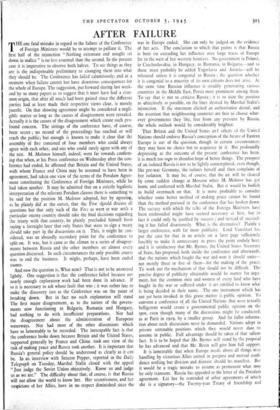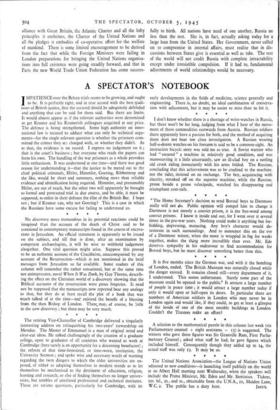AFTER FAILURE
THE one fatal mistake in regard to the failure of the Conference of Foreign Ministers would be to attempt to palliate it. The first half of the injunction " Nothing extenuate and nought set down in malice " is no less essential than the second. In the present case it is imperative to observe both halves. To see things as they are is the indispensable preliminary to changing them into what they should be. The Conference has failed calamitously, and at a moment when failure cannot but have disastrous consequences for the whole of Europe. The suggestion, put forward during last week- end by so many papers as to suggest that it muss have had a com- mon origin, that after all much had been gained since the different parties had at least made their respective views clear, is merely puerile. On that showing agreement might be considered a negli- gible matter so long as the causes of disagreement were revealed. Actually it is the causes of the disagreement which create such pro- found concern. The sittings of the conference have, of course, been secret ; no record of the proceedings has reached or will reach the public; but enough is known to make it clear that the assembly of five consisted of four members who could always agree with each other, and one who could rarely agree with any of the rest. M. Molotov himself, indeed, went far towards confirm- ing that when, at his Press conference on Wednesday after the con- ference had ended, he affirmed that Britain and the United States, with whom France and China may be assumed to have been in agreement, had taken one view of the terms of the Potsdam Agree- ment constituting the Conference of Foreign Ministers, while he had taken another. It may be admitted that on a strictly legalistic interpretation of the relevant Potsdam clauses there is something to be said for the position M. Molotov adopted, but by agreeing, as he plainly did at the outset, that the Five sliould discuss all questions but that only such of the Five as were at war with a particular enemy country should take the final decisions regarding the treaty with that country, he plainly precluded himself from saying a fortnight later that only States that were to sign a treaty should take part ip the discussions on it. This, it might be con- sidered, was an absurdly secondary point for the conference to split on. It was, but it came as the climax to a series of disagree- ments between Russia and the other members on almost every question discussed. In such circumstances the only possible course was to end the business. It might, perhaps, have been ended sooner.
And now the question is, What next? That is not to be answered lightly. One suggestion is that the conference failed because not nearly enough exploratory work had been done in advance. If so it is necessary to ask whose fault that was ; it was rather late to make the discovery just as the Conference was on the point of breaking down. But in fact no such explanation will stand The first major disagreement, as to the nature of the govern- ments now functioning in Bulgaria, Rumania and Hungary, had nothing to do with insufficient preparations. Nor had the disagreement about the administration of European waterways. Nor had most of the other dissensions which have so lamentably to be recorded. The inescapable fact is that the conference broke down because Britain and the United States, supported generally by France and China. took one view of the task of making peace and Russia took another. It is important that Russia's general policy should be understood as clearly as it can be. hi an interview with Senator Pepper, reported in the Daily Telegraph on Tuesday, Marshal Stalin closed with the appeal " Just judge the Soviet Union objectively. Know us and judge us as we are." The difficulty about that, of course, is that Russia will not allow the world to know her. Her secretiveness, and her suspicions of her Allies, have in no respect diminished since the war in Europe ended. She can only be judged on the evidence of her acts. The conclusion to which that points is that Russia is bent on extending her influence over large tracts of Europe far to the west of her western frontiers. No government in Poland, in Czechoslovakia, in Hungary, in Rumania, in Bulgaria,—and to these must probably be added Yugoslavia and Austria—will be tolerated unless it is congenial to Russia ; the question .whether it is congenial to a majority of its own citizens does not arise. At the same time Russian influence is steadily penetrating various countries in the Middle East, Persia most prominent among them. To say that is not to criticise Russia ; it is to state the position as objectively as possible, on the lines desired by Marshal Stalin's injunction. If the statement elicited an authoritative denial, and the assertion that neighbouring countries are free to choose what- ever governments they like, free from any pressure by Russia, the whole outlook would be considerably brighter.
That Britain and the United States ani others cf the United Nations should endorse Russia's conception of the future of Eastern Europe is out of the question, though in certain circumstances they may have no choice but to acquiesce in it. But profoundly depressing as the outcome of the present conference has been, it is much too sopn to abandon hope of better things. The prospect of an isolated Russia is not to be lightly contemplated, even though, like pre-war Germany, she isolates herself and then complains of her isolation. It may be, of course, that the air will be cleared by some sudden change at Moscow when M. Molotov has got home and conferred with Marshal Stalin. But it would be foolish to build overmuch on that. It is more profitable to consider whether some better method of making peace cannot be found than the method pursued in the conference that has broken down. The secrecy with which the talks of the Foreign Ministers have been enshrouded might have seemed necessary at first, but in fact it could only be justified by success ; and instead of succeed- ing it has failed disastrously. What is the alternative? Plainly a larger conference, with far more publicity. Lord Vansittart has put the case for that in an article on a later page sufficiently forcibly to make it unnecessary to press the point unduly here, and it is satisfactory that Mr. Byrnes, the United States Secretary of State, has proposed, both inside the conference and afterwards, that the nations which fought the war and won it should unite— not merely three or five of them—for the making of the peace. To work out the mechanism of that should not be difficult. The precise degree of publicity obtainable would be matter for argu- ment, but the common men and women of every land who have fought in the war or suffered. under it arc entitled to know what is being decided in their name. The one instrument which has not yet been invoked in this grave matter is public opinion. To convene a conference of all the United Nations that were actually belligerent would create a governmental public opinion on the spot, even though many of the discussions might he conducted, as at Paris in 1919, by a smaller group. And far fuller informa- tion about such discussions must be demanded. Nations adopt in private untenable positions which they would never dare to assume in public. Full advantage should be taken of that salient fact. It is to be hoped that Mr. Byrnes will stand by the proposal he has advanced and that Mr. Bevin will give him full support.
It is lamentable that when Europe needs above all things wise handling by victorious Allies united in purpose and mutual confi- dence nothing but division and distrust should be. manifest. But it would be a tragic mistake to assume as permanent what may be only transient. Russia has appealed to the letter of the Potsdam agreement. Let her be reminded of other agreements of which she is a signatory—the Twenty-year Treaty of friendship and alliance with Great Britain, the Atlantic Charter and all the lofty principles it enshrines, the Charter of the United Nations and all the pledges it embodies of co-operative effort for the welfare of mankind. There is some limited encouragement to be derived from the fact that while the Foreign Ministers were failing in London preparations for bringing the United Nations organisa- tions into full existence were going steadily forward, and that in Paris the new World Trade Union Federation has come success- fully to birth. All nations have need of one another, Russia no less than the rest. She is, in fact, actually asking today for a large loan from the United States. Her Government, never called on to compromise in internal affairs, must realise that in dis- cussions between States give is essential as well as take. The rest of the world will not credit Russia with complete intractability except under irresistible compulsion. If it had to, fundamental adjustments of world relationships would be necessary.



























 Previous page
Previous page